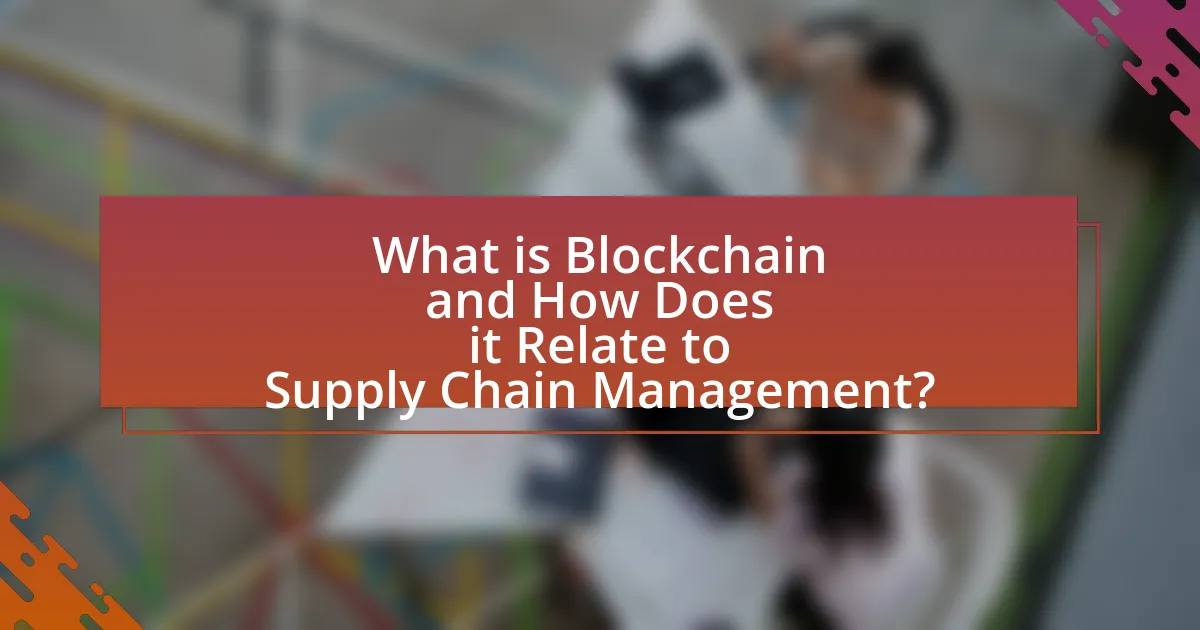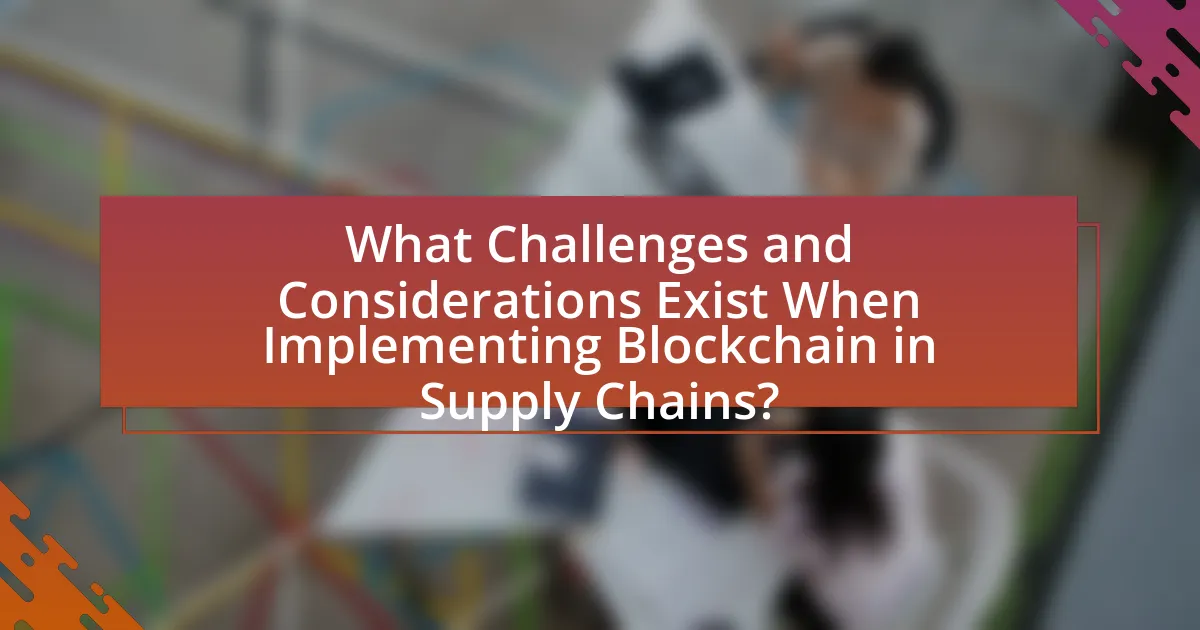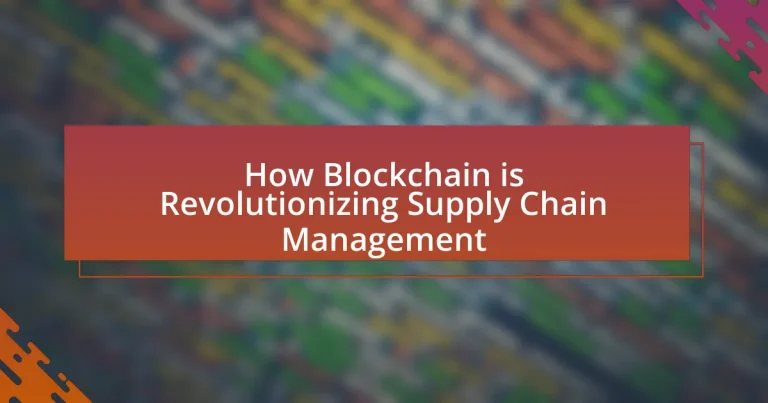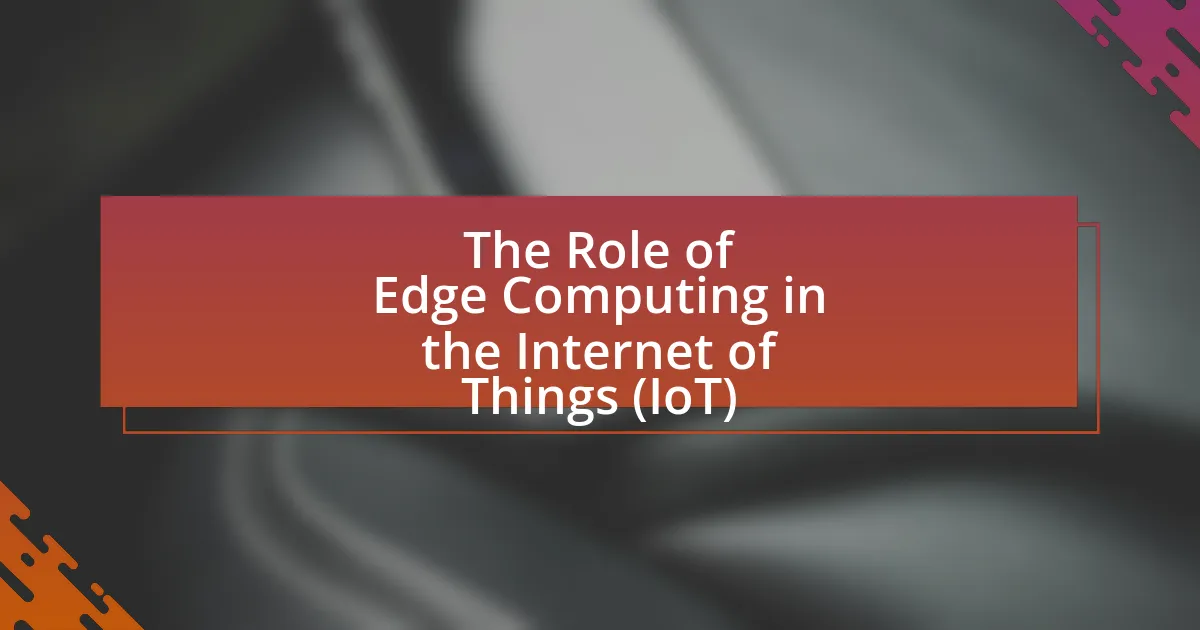Blockchain is a decentralized digital ledger technology that is transforming supply chain management by enhancing transparency, traceability, and efficiency. This article explores how blockchain functions within supply chains, detailing its key components such as decentralization and immutability, and the benefits it offers, including cost reductions and improved collaboration among stakeholders. It also addresses the limitations of traditional supply chain management, the challenges of implementing blockchain, and best practices for successful integration. Additionally, the article highlights the role of smart contracts and real-time data sharing in decision-making, while considering regulatory compliance and data privacy issues that organizations must navigate.

What is Blockchain and How Does it Relate to Supply Chain Management?
Blockchain is a decentralized digital ledger technology that securely records transactions across multiple computers, ensuring that the recorded data cannot be altered retroactively. In supply chain management, blockchain enhances transparency, traceability, and efficiency by providing a single source of truth for all parties involved. For instance, a study by the World Economic Forum indicates that blockchain can reduce supply chain costs by up to 20% by streamlining processes and minimizing fraud. This technology allows stakeholders to track the movement of goods in real-time, verify the authenticity of products, and improve collaboration among suppliers, manufacturers, and retailers.
How does blockchain technology function in supply chains?
Blockchain technology functions in supply chains by providing a decentralized and immutable ledger that enhances transparency, traceability, and security of transactions. Each transaction or movement of goods is recorded on the blockchain, allowing all parties involved in the supply chain to access real-time data regarding the status and location of products. This transparency reduces fraud and errors, as every participant can verify the authenticity of the information. For instance, a study by the World Economic Forum in 2020 highlighted that blockchain can reduce supply chain costs by up to 20% by streamlining processes and minimizing disputes.
What are the key components of blockchain technology?
The key components of blockchain technology are decentralization, transparency, security, and immutability. Decentralization allows data to be stored across a network of computers, reducing the risk of a single point of failure. Transparency ensures that all participants in the network can view the same data, fostering trust among users. Security is achieved through cryptographic techniques that protect data from unauthorized access and tampering. Immutability means that once data is recorded on the blockchain, it cannot be altered or deleted, providing a reliable and permanent record of transactions. These components collectively enable blockchain to enhance supply chain management by improving traceability, accountability, and efficiency.
How does decentralization enhance supply chain transparency?
Decentralization enhances supply chain transparency by distributing data across multiple nodes, allowing all participants to access the same information in real-time. This structure reduces the risk of data manipulation and fosters trust among stakeholders, as each participant can verify transactions independently. For instance, blockchain technology, which operates on a decentralized ledger, ensures that every transaction is recorded and immutable, providing an auditable trail. Research by the World Economic Forum highlights that implementing blockchain can increase transparency and traceability in supply chains, leading to improved accountability and reduced fraud.
Why is blockchain considered a game changer for supply chains?
Blockchain is considered a game changer for supply chains because it enhances transparency, traceability, and security in transactions. By providing a decentralized ledger that records every transaction in real-time, blockchain allows all parties in the supply chain to access the same information simultaneously, reducing discrepancies and fraud. For instance, a study by the World Economic Forum in 2020 highlighted that blockchain technology could reduce supply chain-related costs by up to 20% through improved efficiency and reduced errors. Additionally, the ability to trace the origin of products ensures compliance with regulations and enhances consumer trust, as seen in industries like food and pharmaceuticals where provenance is critical.
What are the limitations of traditional supply chain management?
Traditional supply chain management faces several limitations, including lack of transparency, inefficiency, and vulnerability to disruptions. These limitations arise because traditional systems often rely on centralized databases, which can lead to data silos and hinder real-time visibility across the supply chain. For instance, a study by the World Economic Forum highlights that 79% of supply chain executives believe that a lack of transparency can lead to inefficiencies and increased costs. Additionally, traditional supply chains are often slow to adapt to changes, making them less resilient to market fluctuations and disruptions, as evidenced by the challenges faced during the COVID-19 pandemic.
How does blockchain address these limitations?
Blockchain addresses limitations in supply chain management by providing transparency, traceability, and security. It enables all parties in the supply chain to access a single, immutable ledger that records every transaction, which reduces the risk of fraud and errors. For instance, according to a report by the World Economic Forum, blockchain can enhance transparency by allowing stakeholders to track the origin and journey of products in real-time, thereby improving accountability. Additionally, the decentralized nature of blockchain eliminates the need for intermediaries, which streamlines processes and reduces costs. This combination of features effectively mitigates issues related to trust, data integrity, and operational inefficiencies in supply chains.

What are the Key Benefits of Implementing Blockchain in Supply Chain Management?
The key benefits of implementing blockchain in supply chain management include enhanced transparency, improved traceability, and increased efficiency. Enhanced transparency allows all stakeholders to access real-time data, reducing information asymmetry and fostering trust. Improved traceability enables the tracking of products from origin to destination, which is crucial for quality control and compliance with regulations. Increased efficiency is achieved through the automation of processes and reduction of paperwork, leading to faster transactions and lower operational costs. According to a report by the World Economic Forum, blockchain technology can reduce supply chain costs by up to 20% by streamlining operations and minimizing fraud.
How does blockchain improve traceability in supply chains?
Blockchain improves traceability in supply chains by providing a decentralized and immutable ledger that records every transaction and movement of goods. This technology enables all participants in the supply chain to access real-time data regarding the origin, journey, and handling of products, ensuring transparency and accountability. For instance, a study by the World Economic Forum highlights that blockchain can reduce the time spent on tracking goods by up to 80%, thereby enhancing efficiency and trust among stakeholders. Additionally, the ability to trace products back to their source helps in identifying issues such as fraud or contamination, ultimately leading to improved safety and compliance in supply chains.
What role does smart contracts play in enhancing efficiency?
Smart contracts enhance efficiency by automating and streamlining processes within supply chain management. They execute predefined agreements automatically when conditions are met, reducing the need for intermediaries and minimizing delays. For instance, a study by Accenture found that smart contracts can reduce contract execution time by up to 90%, significantly speeding up transactions and improving overall operational efficiency. This automation not only lowers costs but also increases transparency and trust among parties involved, as all transactions are recorded on the blockchain and are immutable.
How does real-time data sharing impact decision-making?
Real-time data sharing significantly enhances decision-making by providing immediate access to accurate and relevant information. This immediacy allows organizations to respond swiftly to changes in supply chain dynamics, such as demand fluctuations or inventory levels. For instance, a study by McKinsey & Company found that companies leveraging real-time data can reduce supply chain costs by up to 15% and improve service levels by 20%. This data-driven approach enables better forecasting, risk management, and operational efficiency, ultimately leading to more informed and timely decisions.
What cost savings can be achieved through blockchain integration?
Blockchain integration can achieve significant cost savings by reducing transaction fees, minimizing fraud, and enhancing supply chain efficiency. By utilizing smart contracts, businesses can automate processes, which decreases the need for intermediaries and lowers operational costs. A study by Accenture found that blockchain could reduce supply chain costs by up to 30% through improved transparency and traceability, leading to fewer disputes and lower compliance costs. Additionally, the immutable nature of blockchain helps prevent fraud, which can save companies substantial amounts in losses associated with counterfeit goods.
How does reducing fraud and errors lead to financial benefits?
Reducing fraud and errors leads to financial benefits by minimizing losses associated with financial discrepancies and enhancing operational efficiency. When fraud is reduced, companies experience fewer financial write-offs and legal costs, which directly improves their bottom line. For instance, a study by the Association of Certified Fraud Examiners found that organizations lose about 5% of their revenue to fraud annually. Additionally, reducing errors in transactions and inventory management can lead to lower operational costs and improved resource allocation, as accurate data allows for better decision-making. This efficiency can result in increased profitability, as companies can allocate resources more effectively and reduce waste.
What are the long-term savings associated with blockchain adoption?
Long-term savings associated with blockchain adoption in supply chain management include reduced operational costs, enhanced efficiency, and minimized fraud. By streamlining processes through smart contracts and decentralized ledgers, companies can significantly lower transaction costs and administrative overhead. For instance, a study by Accenture found that blockchain could reduce supply chain costs by up to 30% by improving transparency and traceability. Additionally, the elimination of intermediaries leads to faster transactions and reduced delays, further contributing to cost savings. These factors collectively demonstrate that blockchain adoption can yield substantial long-term financial benefits for organizations in supply chain management.

What Challenges and Considerations Exist When Implementing Blockchain in Supply Chains?
Implementing blockchain in supply chains faces several challenges and considerations, including scalability, interoperability, and regulatory compliance. Scalability issues arise as blockchain networks may struggle to handle high transaction volumes typical in supply chains, potentially leading to delays. Interoperability concerns exist because different blockchain systems may not communicate effectively, hindering data sharing across platforms. Regulatory compliance is critical, as varying laws across jurisdictions can complicate the adoption of blockchain technology. For instance, a study by the World Economic Forum highlights that 77% of executives cite regulatory uncertainty as a significant barrier to blockchain implementation in supply chains.
What are the technical challenges of blockchain integration?
The technical challenges of blockchain integration include scalability, interoperability, and security. Scalability issues arise as blockchain networks struggle to handle a high volume of transactions efficiently; for instance, Bitcoin processes approximately seven transactions per second, while traditional payment systems like Visa can handle over 24,000. Interoperability challenges occur when different blockchain systems cannot communicate or share data seamlessly, hindering collaboration across platforms. Security concerns also persist, particularly regarding vulnerabilities in smart contracts and potential attacks on the network, as evidenced by incidents like the DAO hack in 2016, which resulted in a loss of $60 million. These challenges must be addressed to fully leverage blockchain technology in supply chain management.
How can interoperability issues be resolved?
Interoperability issues can be resolved by implementing standardized protocols and frameworks that facilitate communication between different blockchain systems. For instance, the use of cross-chain technology, such as atomic swaps or interoperability protocols like Polkadot and Cosmos, allows disparate blockchains to exchange data and value seamlessly. These technologies enable various supply chain participants to interact without needing a centralized intermediary, thus enhancing efficiency and transparency. Additionally, adopting industry-wide standards, such as the ISO 20022 for financial transactions, can further streamline interoperability by providing a common language for data exchange across platforms.
What are the scalability concerns for blockchain in supply chains?
Scalability concerns for blockchain in supply chains primarily involve transaction throughput, latency, and network congestion. Current blockchain technologies, such as Bitcoin and Ethereum, can handle only a limited number of transactions per second, which is insufficient for the high volume of transactions typical in supply chains. For instance, Bitcoin processes approximately 7 transactions per second, while Ethereum handles around 30, whereas traditional payment systems like Visa can process over 24,000 transactions per second. This discrepancy leads to delays and increased costs during peak demand periods. Additionally, as more participants join the network, the increased data load can result in slower transaction times and higher fees, further complicating scalability. These limitations hinder the ability of blockchain to serve as a viable solution for large-scale supply chain operations.
What regulatory and compliance issues should be considered?
Regulatory and compliance issues in blockchain for supply chain management include data privacy, security standards, and cross-border regulations. Data privacy laws, such as the General Data Protection Regulation (GDPR) in Europe, mandate that personal data must be handled with strict consent and transparency, impacting how blockchain systems store and process information. Security standards, like the ISO/IEC 27001, require organizations to implement robust security measures to protect sensitive data on blockchain networks. Additionally, cross-border regulations complicate compliance, as different jurisdictions may have varying laws regarding the use of blockchain technology, necessitating a thorough understanding of international trade laws and regulations.
How do data privacy laws affect blockchain implementation?
Data privacy laws significantly impact blockchain implementation by imposing restrictions on how personal data can be collected, stored, and processed. For instance, regulations like the General Data Protection Regulation (GDPR) in the European Union require that individuals have control over their personal data, which conflicts with blockchain’s inherent transparency and immutability. This necessitates the development of privacy-focused solutions, such as zero-knowledge proofs, to ensure compliance while maintaining the benefits of blockchain technology. Additionally, organizations must implement data minimization practices and ensure that any personal data recorded on the blockchain is either anonymized or encrypted to adhere to legal standards, thereby influencing the design and functionality of blockchain systems in supply chain management.
What industry standards must be adhered to when using blockchain?
When using blockchain, industry standards such as ISO/IEC 27001 for information security management, ISO 9001 for quality management systems, and the General Data Protection Regulation (GDPR) for data protection must be adhered to. These standards ensure that blockchain implementations are secure, reliable, and compliant with legal requirements. For instance, ISO/IEC 27001 provides a framework for managing sensitive information, which is crucial for maintaining trust in blockchain applications within supply chains. Compliance with GDPR is essential for protecting personal data processed on blockchain networks, particularly in supply chain scenarios involving customer information.
What are the best practices for successfully implementing blockchain in supply chains?
The best practices for successfully implementing blockchain in supply chains include ensuring stakeholder collaboration, selecting the right blockchain platform, and focusing on data integrity and security. Stakeholder collaboration is crucial as it fosters trust and alignment among all parties involved, which is essential for a decentralized system. Choosing the appropriate blockchain platform, such as Ethereum or Hyperledger, is vital to meet specific supply chain needs, including scalability and interoperability. Additionally, prioritizing data integrity and security through encryption and access controls helps protect sensitive information and maintain the reliability of the blockchain. These practices are supported by case studies, such as IBM’s Food Trust, which demonstrates improved traceability and transparency in food supply chains, showcasing the effectiveness of these best practices in real-world applications.
How can organizations prepare for a blockchain transition?
Organizations can prepare for a blockchain transition by conducting a thorough assessment of their current processes and identifying areas where blockchain can add value. This involves evaluating existing supply chain operations, understanding the specific challenges faced, and determining how blockchain technology can enhance transparency, traceability, and efficiency. For instance, a study by Deloitte found that 40% of organizations that implemented blockchain reported improved supply chain visibility, which underscores the importance of aligning blockchain capabilities with organizational needs. Additionally, organizations should invest in training their workforce on blockchain technology and collaborate with technology partners to ensure a smooth integration process.
What strategies can be employed to ensure stakeholder buy-in?
To ensure stakeholder buy-in, organizations should employ strategies such as effective communication, involvement in decision-making, and demonstrating value. Effective communication involves clearly articulating the benefits of blockchain technology in supply chain management, such as increased transparency and efficiency. Involvement in decision-making allows stakeholders to feel valued and invested in the process, fostering a sense of ownership. Demonstrating value can be achieved through pilot projects that showcase tangible results, such as reduced costs or improved traceability, which can be supported by case studies from companies like IBM and Maersk that have successfully implemented blockchain solutions in their supply chains.




